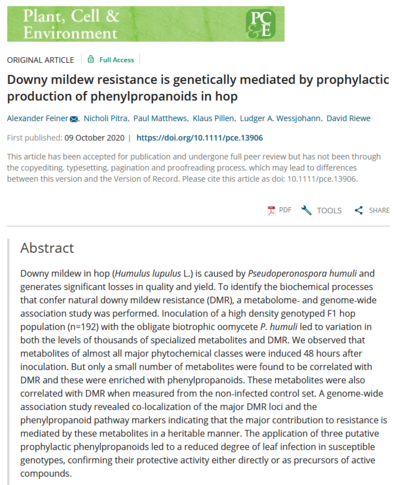Downy mildew resistance is genetically mediated by prophylactic production of phenylpropanoids in hop.
Researchers from IPB, JKI and Hopsteiner GmbH recently published a study in Plant, Cell & Environment on the underlying genetics of downy mildew resistance in hop (Humulus lupulus L.). Downy mildew in hop is caused by Pseudoperonospora humuli and causes significant losses in quality and yield.
To identify the biochemical processes that confer natural downy mildew resistance, the researchers performed a metabolome- and genome-wide association study. They found that a small number of metabolites was correlated with downy mildew resistance and these were enriched in phenylpropanoids. The application of three putative prophylactic phenylpropanoids led to a reduced degree of leaf infection in susceptible genotypes, confirming their protective activity either directly or as precursors of active compounds.
Since the researchers also observed the same correlation of resistance and metabolites in the experiment with non-infected plants, they suspected that these metabolites play a role as inherent, infection-independent protective compounds. A genome-wide association study revealed co-localization of the major downy mildew resistance loci and the phenylpropanoid pathway markers indicating that the major contribution to resistance is mediated by these metabolites in a heritable and non-induced manner. In the future, these findings may inform hop breeding to generate varieties that require less pesticide application.
Original publication:
Feiner A, Pitra N, Matthews P, Pillen K, Wessjohann LA, Riewe D. Downy mildew resistance is genetically mediated by prophylactic production of phenylpropanoids in hop. Plant Cell Environ. 2020 Oct 9. doi: 10.1111/pce.13906. Epub ahead of print.


